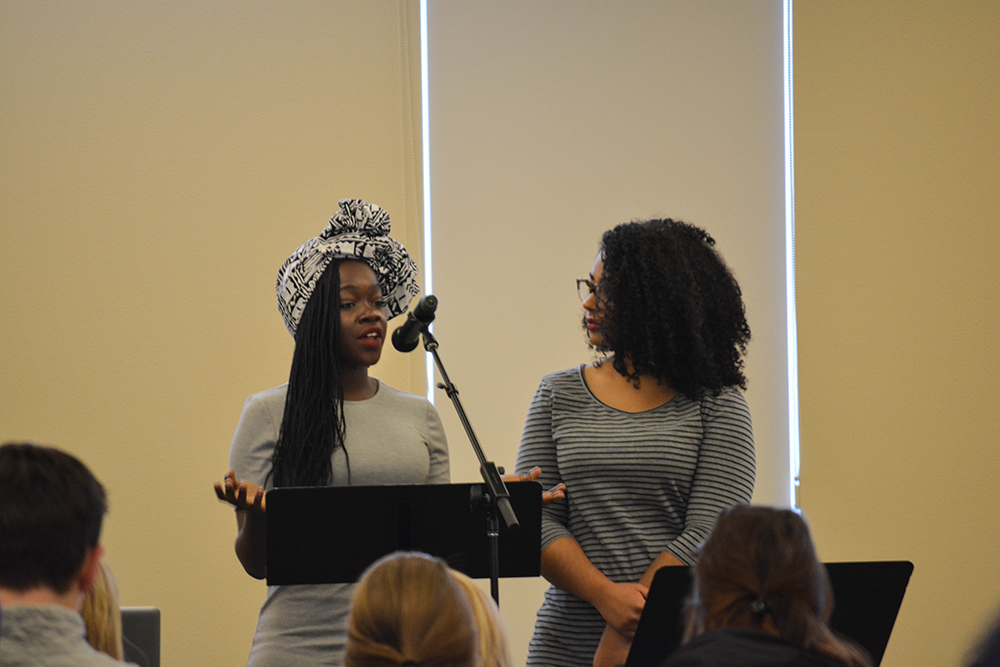Following the tradition of years past, Monday morning’s second MLK Day event, the Spoken Word Coffeehouse, gave space for the Goshen community to listen to poetry and song from fourteen students of color, who volunteered to perform for the event. The event was planned by GC Black Student Union (BSU) leaders Alia Byrd, a junior elementary education major, and Achieng Agutu, a senior public relations major.
When asked about the mentality behind the organization of the event, Byrd reflected on the importance of hearing the experiences of students of color.“The rest of the day is about listening to voices coming from outside our community,” Byrd said. “That is why we need to have a time to hear from members of our own community, who deal with these issues every day.”
The goal of the planning committee was, from her perspective, “to inspire further action, and to give space for students of color to celebrate who they are.”
Zack Begly, a first-year broadcasting major, and Mezrae Watt, a first-year biology major, began the Coffeehouse with performances of spoken word poetry; Zack with an original piece titled “I Have a Question,” and Mezrae with her delivery of “Black Girls.” These first acts were followed by first-year ASL major Terra Kincy’s powerful rendition of “Feelin’ Good,” originally recorded by singer and Civil Rights activist Nina Simone in 1965.
Byrd and LaShawn Smith-Wright, a first-year ASL major, followed Kincy’s with original poems, speaking to their identities as black students on Goshen’s campus and the realities that they have faced as such.
Following this, a group of seven African students, Deborah Kankolongo Tshidimu and Sonia Nzuzi, both seniors, Yedidiya Zewdu and Alhassan Barrie, both juniors, and sophomores Delphin Monga, Vincent Kibunja and Samra Stoner performed as a group, using spoken word poetry combined with music to share their experiences pushing back against the stereotypes set to them as Africans, especially living within a majority white context.
Bringing the show to a close, seniors Achieng Agutu and Ari Benjamin presented two final pieces of poetry. Agutu’s piece, an original work titled “In The Beginning,” celebrated the beauty and power of black women, borrowing from Beyoncé’s album “Lemonade” for pieces of the performance. Benjamin’s piece gave voice to the emotions and memories of growing up as a child of color and living into the challenge of realizing self-worth within the context of western, predominately white culture.
“This event is important because people often use MLK day as an opportunity to say that ‘we have come so far since Dr. King was on this campus,’ but even now, a lot of students of color continue to hide their experiences,” Byrd said. “This is a time for that expression. It’s important for students and faculty to see that black students are still struggling on campus, and that it’s not all kumbaya.”
A performance of this nature comes with difficulties. “We’re standing in front of a room of people who don’t look like us, telling hard, personal stories,” Byrd said. “There’s a challenge to knowing you’ve put yourself in the position of a spokesperson, even though you don’t necessarily have all the answers.”
Despite this challenge, Byrd said, “Black students are used to extending grace. It can be frustrating to have to be the ones to give that grace, but we know that because we want change, and because of our heritage, we often say ‘We’ll fix it ourselves. As performers, these BSU members had some implied responsibilities to be spokespeople, and had to decide to take that on.”
Their willingness to take on this responsibility, and to extend the grace which they have, is a powerful statement to our community as a whole.
The performances were followed by a brief talkback session, wherein members of the community were given a space for questions, comments, and words of affirmation for the performers. The event was met with very positive feedback, and community members have reflected on the event’s success in its goal of promoting the voices which the Goshen community often fails to hear. In light of this success, Byrd calls for members of the Goshen community to continue the conversation and continue seeking education and reflection on the issue of race as it pertains to this community.



